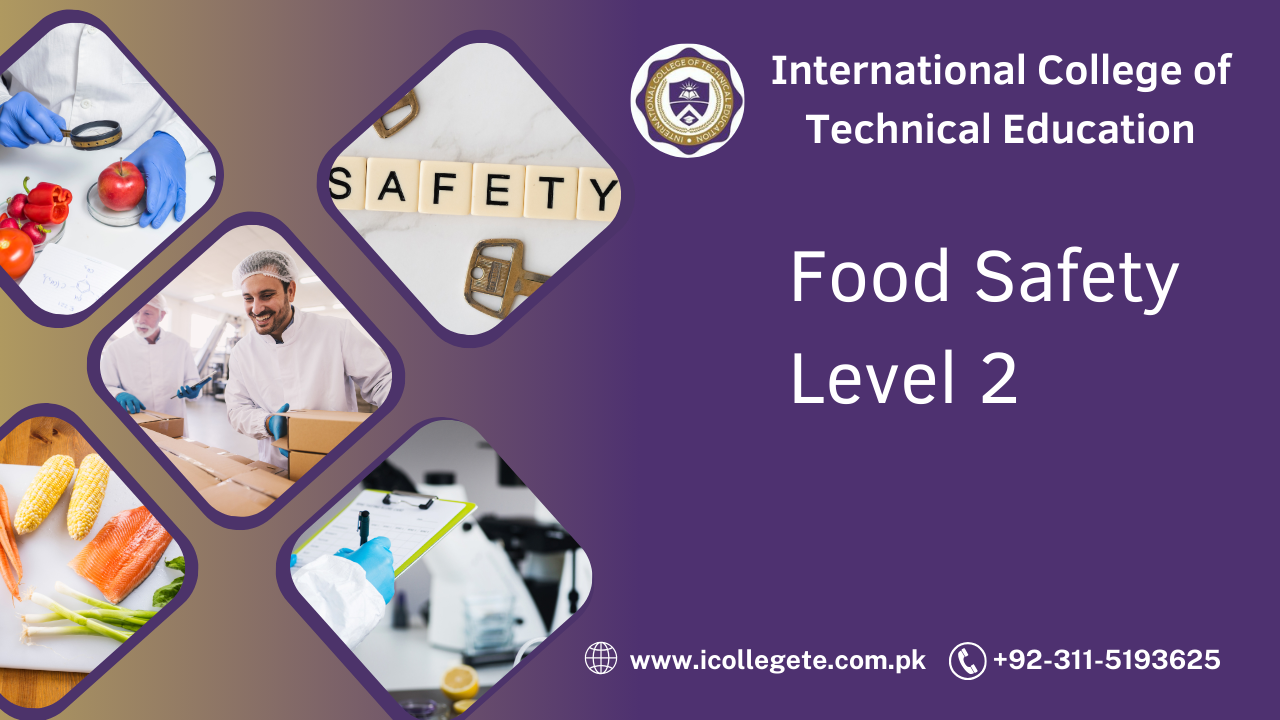Food safety is a critical concern for every business in the food industry. Ensuring that food is safe to consume is not just a regulatory requirement but also essential for public health. The Food Safety Level 2 course in Sargodha is an advanced course designed for those working with food who want to deepen their understanding of food safety practices.
The Food Safety Level 2 course is a widely recognized certification that builds on the foundation of basic food safety knowledge. It provides in-depth training in food safety management, allowing participants to apply safety protocols to ensure food is safe for consumption in more complex work environments. This course is perfect for food handlers, managers, and supervisors who are responsible for food safety in restaurants, hotels, catering, food retail, and food manufacturing settings. By completing this course, individuals will be equipped with the necessary skills to comply with food safety regulations, minimize the risk of contamination, and create a safer environment for both staff and customers.
Course Overview
The Food Safety Level 2 course in Sargodha covers a wide array of topics related to food safety, including the prevention of contamination, safe food storage, hygiene practices, and effective food safety management systems. This course is designed to ensure that food businesses meet the legal requirements set out by health authorities, and it teaches participants how to implement effective food safety measures in their workplace. The course includes practical advice on managing food safety risks, how to comply with food hygiene regulations, and how to deal with potential hazards such as allergens, temperature control, and foodborne diseases.
Typically, the course is completed in a few days and involves a mixture of theoretical knowledge, case studies, and practical exercises. Participants will learn how to manage food safety risks in real-world scenarios and understand the importance of personal hygiene, cleanliness, and food storage practices.
Study Units
The Food Safety Level 2 course typically covers the following modules:
- Introduction to Food Safety
- The importance of food safety and its impact on public health.
- The roles and responsibilities of food handlers and businesses.
- Foodborne Illnesses and Contamination
- Understanding the causes of foodborne illnesses and the types of contamination (physical, chemical, and biological).
- How to identify potential hazards and take steps to prevent contamination.
- Personal Hygiene and Health
- The role of personal hygiene in preventing foodborne illnesses.
- Best practices for food handlers, including handwashing, use of protective clothing, and reporting illnesses.
- Food Safety Regulations
- Overview of local and international food safety regulations, including the Food Safety Act.
- Understanding the legal obligations of food handlers and food businesses.
- Food Storage and Temperature Control
- How to safely store food to prevent spoilage and contamination.
- The importance of maintaining correct temperatures for food storage, preparation, and service.
- Cleaning, Sanitizing, and Pest Control
- Procedures for effective cleaning and sanitizing of food preparation areas and equipment.
- Understanding the importance of pest control in food safety.
- Allergen Management
- How to identify and manage food allergens in the food service environment.
- Procedures for labeling food and preventing cross-contamination with allergens.
- Food Safety Management Systems
- An introduction to food safety management systems, such as HACCP (Hazard Analysis and Critical Control Points).
- Implementing food safety practices and ensuring compliance with food safety standards.
- Monitoring and Auditing Food Safety Practices
- How to monitor food safety practices to ensure compliance.
- Conducting internal audits and identifying areas for improvement.
Learning Outcomes
Upon completing the Food Safety Level 2 course, participants will:
- Have a deeper understanding of food safety principles and their application in the food industry.
- Be able to identify and prevent food contamination from biological, chemical, and physical hazards.
- Understand the importance of personal hygiene and how it contributes to food safety.
- Be proficient in handling, storing, and serving food safely to prevent contamination.
- Be familiar with food safety laws, regulations, and industry standards, and know how to comply with them.
- Be able to implement and manage food safety practices within a business or organization.
- Understand allergen management procedures and how to avoid allergen contamination.
- Know how to clean and sanitize food preparation areas effectively and control pest infestations.
- Be able to contribute to the development and management of food safety management systems.
Course Benefits
- Comprehensive Knowledge: Gain advanced knowledge of food safety practices and management systems that are vital in a food handling environment.
- Increased Career Prospects: A Food Safety Level 2 certification opens up job opportunities in food service management, food safety auditing, and quality control within the food industry.
- Legal Compliance: Learn about local and international food safety regulations to ensure that your organization meets the required health standards.
- Enhanced Workplace Safety: The course helps reduce the risk of foodborne illnesses, which protects consumers and enhances the reputation of food businesses.
- Practical Skills: Participants will gain practical skills in risk management, food storage, temperature control, and sanitation, which can be directly applied in the workplace.
- Improved Food Quality: Understanding and implementing food safety best practices ensures higher-quality food products and services, leading to customer satisfaction and business success.
Who Is This Course For?
The Food Safety Level 2 course is suitable for:
- Food Handlers: Individuals working with food in any capacity who need to understand food safety practices and their responsibilities.
- Managers and Supervisors: Supervisors and managers in food service, catering, retail, and manufacturing sectors who are responsible for food safety within their teams.
- Catering Staff: Professionals in the catering industry who are responsible for preparing, storing, and serving food.
- Retail Workers: Employees in grocery stores, supermarkets, and food shops who handle fresh food or packaged products.
- Quality Control Personnel: Individuals responsible for ensuring the quality and safety of food products and services.
- Health and Safety Professionals: Individuals working in health and safety roles within food-related industries who wish to gain further expertise in food safety management.
Future Progression
After completing the Food Safety Level 2 course, participants can further advance their knowledge and skills by pursuing:
- Food Safety Level 3: This is a more advanced course for those who are in supervisory or management roles in the food industry and need to implement and oversee food safety systems.
- HACCP Training: Further specialized training in Hazard Analysis and Critical Control Points (HACCP), a system that helps food businesses manage food safety risks.
- Food Safety Auditor Certification: For those interested in conducting audits to assess food safety compliance in various food establishments.
- NEBOSH Certificate in Food Safety: A higher-level qualification that covers a broader range of health and safety concerns in the food industry, providing more in-depth knowledge.
- Specialized Courses: Individuals can pursue specialized courses in areas such as allergen management, advanced cleaning procedures, or food quality control.
The Food Safety Level 2 course in Sargodha offers a thorough and practical understanding of food safety principles, ensuring that participants are well-equipped to maintain food safety standards in various food handling environments. This course is essential for individuals in the food industry who are looking to enhance their career prospects, improve food safety practices, and comply with legal regulations. Whether you are a food handler, manager, or supervisor, this certification will provide you with the skills and knowledge necessary to contribute to a safer, more efficient food service operation.







